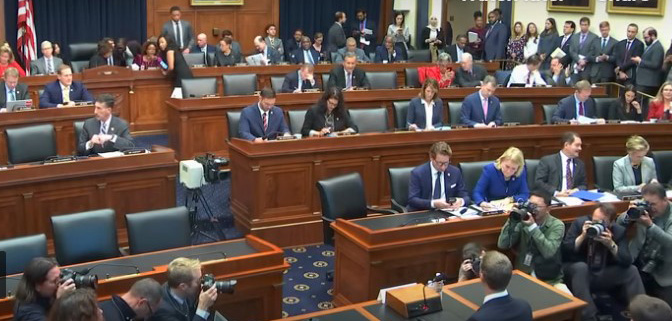
MBA Letter Outlines Support, Concerns for Housing-Related Bills

(The House Financial Services Committee meets in March.)
Ahead of a House Financial Services Committee markup session Tuesday, the Mortgage Bankers Association sent a letter expressing support–and concern–for several bills under the Committee’s consideration.
The letter to Committee Chair Maxine Waters, D-Calif., and Ranking Member Patrick McHenry, R-N.C. from MBA Senior Vice President of Legislative and Political Affairs Bill Killmer discussed the following bills under consideration:
H.R. 2547, the “Comprehensive Debt Collection Improvement Act”
MBA expressed opposition to this bill and any legislation designed to overturn a March 2019 Supreme Court decision, Obduskey V. McCarthy and Holthus LLP, which ruled a business engaged in non-judicial foreclosure proceedings is not a “debt collector” under the Fair Debt Collections Practices Act. MBA expressed strong support for the unanimous SCOTUS ruling.
“Our country’s mortgage lending system – a critical element of our national policy of making home ownership available to as many Americans as possible – continues to rest on the foundation of enforceable security interests in real property,” MBA said. “By allowing lenders to take possession of collateral through foreclosure when a borrower defaults, the law reduces the risk to lenders – which in turn allows them to make credit available to more home buyers at a much lower interest rate than available for unsecured credit.”
MBA noted the entire purpose of non-judicial foreclosure is to avoid the costs and delay of litigation, which inevitably would result from judicial involvement in the foreclosure process. This process also appropriately balances the needs of individuals through robust procedural protections and the benefits to communities of limiting blight or opening new home ownership opportunities.
“MBA supports the unanimous SCOTUS ruling, and opposes any legislation designed to overturn the decision,” MBA said. “Such an outcome would disrupt the choices states have made in structuring their foreclosure regimes, imposing unnecessary costs and delay to the enforcement of real property interests and subsequently the cost of credit.”
H.R. 2553, the “Real Estate Valuation Fairness and Improvement Act of 2021”
MBA agrees with this bill’s premise that more residential appraisers are leaving the industry rather than joining, with the average age of an appraiser currently 58 years old. “There is no question that the profession is in dire need of change to survive into the next generation,” MBA said. “For MBA members, a decline in the number of appraisers may mean a decline in appraisal quality, an increase in appraisal-related costs passed on to consumers, less than equitable valuations and longer “turn-times” in the loan origination process. Consequently, MBA supports the intent of this legislation to broaden participation in the appraisal industry as well as to ensure a fair and transparent appraisal process. Additionally, for the bill’s proposed Real Estate Valuation Task Force to achieve its intended objectives, broader lender participation is required to ensure that lenders representing the diverse sizes, business models, and market segments (single family, multifamily, and commercial) all have input.”
H.R. 1277, the “Improving Corporate Governance Through Diversity Act”
MBA supports an amendment to H.R. 1277, as currently drafted, that would establish an advisory group to increase the diversity of Boards for publicly traded companies. “Diversity at all levels for private sector entities has been increasing in recent years,” MBA said. “Ensuring that decision makers and executives have access to diverse perspectives and opinions increases overall efficiency and improves performance and results.”
H.R. 2123, the “Diversity and Inclusion Data Accountability and Transparency Act”
MBA commends this bill’s intent to ensure a more diverse and inclusive work force in the financial services sector. Section 342 of the Dodd-Frank Act required various federal regulatory agencies to establish Offices of Minority and Women Inclusion. A major function of the OMWIs is to increase diversity at financial institutions and their regulators, and while much work remains to be done, the industry is committed to continuing these important efforts. “MBA welcomes the opportunity to provide ongoing input to this proposal to ensure that additional mandatory reporting requirements are instituted in a manner that achieves the intended effect of building more diversity without imposing additional punitive regulatory burdens,” MBA said.
Resolutions Authorizing the Task Force on Financial Technology and the Task Force on Artificial Intelligence
MBA supports the Committee’s efforts to reauthorize the Task Forces on Financial Technology and Artificial Intelligence. Technological advancements in the financial services sector have developed at a rapid pace. “These developments present new opportunities for consumers, businesses and lenders, but also call for additional discussion to ensure the regulatory structure provides the necessary protections and transparency for functioning markets,” MBA said.
The markup session is expected to continue through the week as needed. Any bills approved will be forwarded to the full House for consideration.
